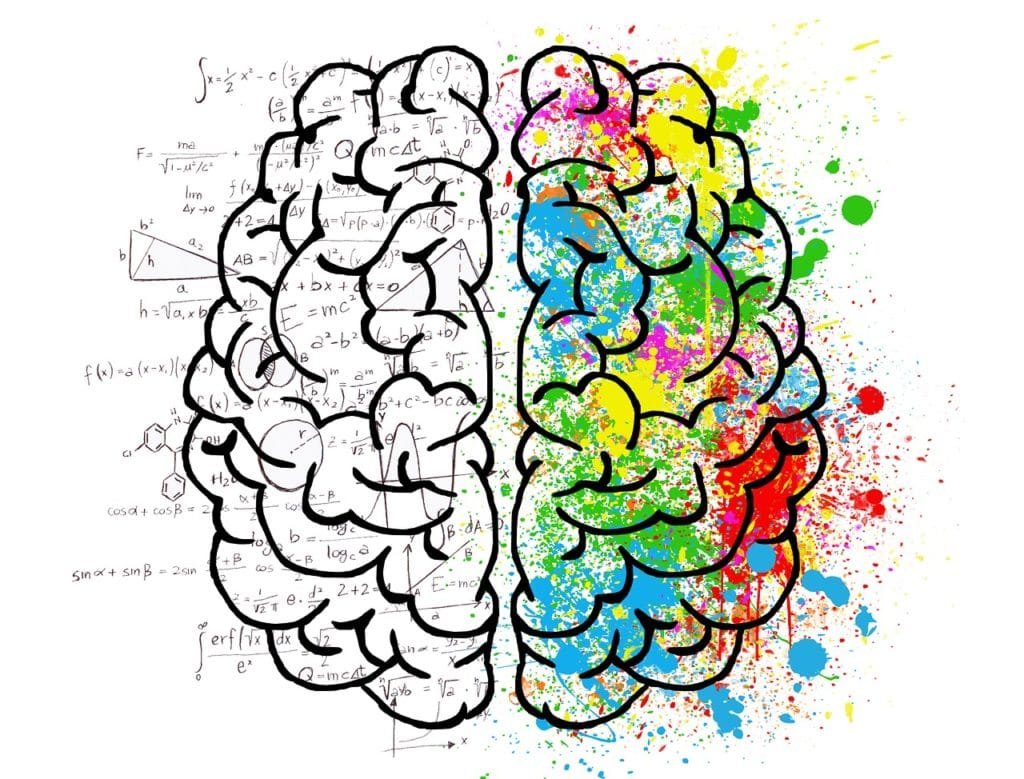The brain is an organ not a light switch
The brain is like any other major organ in the body and controls many different biological functions. And sometimes, like the heart, liver and lungs it might not perform its functions as well as before and might need some sort of “repair”. Unfortunately, we cannot “measure” brain problems in the same way we can measure the heart (echocardiogram), liver (biochemistry tests) or lungs (spirometry tests). Of course, there are brain imaging tools that we can use but these tell us very little about anxiety and depression for example.
The closest we got to understand an OCD brain from a biological perspective was proving that and OCD brain is more active (consumes more glucose) in certain areas than a “normal” brain. This leaves us with only psychological tools to evaluate mental health problems. Treatment can either be a form of psychotherapy (including mindfulness), drug therapy or a combination of both. This approach seems to work to achieve a more balanced brain as some mental disorders such as depression and anxiety have been linked to neurotransmitters problems in the brain.
One thing that all the organs above have in common is that any possible “fix” will require time. However, we tend to approach brain problems (mental health) with the idea that the only thing we need to do to get better is to flick the right switch in our brains. How many times have we heard that mental health has to do with willpower or that “they just need to snap out of it”?
How can we then approach brain recovery in a much healthier way? Let us look at a few things that we can learn from to help us have a strong foundation for recovery.
The antidote
A lot of the time when we start our recovery journey, we tend to focus on the outcome rather than the process. What do I mean by this? I mean that we set goals such as “I will eliminate OCD from my life” or “by the end of treatment I will not feel anxious anymore” or “I will not have intrusive thoughts again”. If we take these goals as measures of success, we are destined to fail. And why, you must ask? Mainly for two reasons:
First, these are all things that we cannot control. As we try to exercise control over things that we do not have any power over, this will only get us more disheartened if we have a bad day or short relapse.
Second, once we build these types of unhealthy expectations – that these are all things to be expected if treatment goes well – our brains will look for evidence that we have not achieved them. The outcome will be that any SMALL problem or setback will look BIG once these expectations set in. Instead of thinking “this is just a short blip” we start thinking “this is a disaster and will never get better from rOCD”. We are setting up ourselves for failure.
What is the antidote then? It is simply focusing on the things that we can control. We can control the process not the results. Examples of this are: exercise, good sleep routines, mindfulness practice, etc. A great quote from Gandhi that illustrates this principle is:
It is for us to make the effort. The result is always in God’s hands.
We should therefore focus on those things that you have control over and be patient. Do not set timelines either. We are aiming for a lifestyle change – to better live with OCD. Does this mean that we cannot be happy? Not at all. People with OCD can be as happy as anyone else.
The radar brain
Your brain is always looking for signs of danger and possible signs of trouble, ESPECIALLY in people with anxiety and rOCD.
Let’s look at this example:
Your boyfriend or girlfriend buys you a present. Your anxiety/OCD kicks in because this means things are getting serious and you start to think a lot about possible meanings, and the story continues… Now, the opposite. He or she does not buy you a present. You might be waiting for one. You start to think the he/she is inconsiderate. Your start to think again that maybe this is not the type of person that you want to be in a relationship with…
Damn if you do, damn if you don’t. An OCD brain will always look for signs of possible dangers even if there are none! Its main job is to keep you safe and sometimes this means interpreting information in the most negative way.

The Hollywood dream and feeling right
One of the problems that many people face when dating or when they are in a steady relationship is that they look for the wrong type of love. The type of love that Hollywood sells. You meet “the ONE” and everything is perfect. You don’t experience any doubts about the relationship, you never have any disagreements and life is perfect because you have the right person by your side. Needless to say that all of these are the result of unrealistic expectations that other people and WE put on ourselves.
Have you ever wondered, how it would feel like to find “the ONE”? Maybe you think that because you feel the anxiety and question everything, then the person you are with is not “the ONE”…and that if you just meet “the ONE”, you will have no more anxiety and the questioning will stop.
Now ask yourself this question: “How many people have found “the ONE”, only to split up a few months later? Had a dream wedding and relationship only to be divorced soon after?” Yes, just look at any tabloid paper…
So, relying on a feeling of “rightness” to make a good choice is not the best strategy. Especially, when we know that people with OCD are in many instances driven by this feeling of wanting to “feel right”. Remember that OCD person that washes their hands 50 times a day because something is just not right? In a way, your brain is lying to you.
Lies and more rOCD lies
An rOCD brain is like Pinocchio. It likes to tell a lie here and there by sending false messages. We can even say that we can see a nose growing when our anxiety increases…
Some of the rOCD brain’s favourite lies are:
“If I am attracted to other people, then I do not love my boyfriend/girlfriend” – Attraction is part of human nature. It is not like a switch that can be switched on and off. Choice is what makes us love our partners.
“If I find the right person, I will not feel anxiety anymore” – The anxiety is not caused by the other person. It is caused by how our brains interpret a possible danger.
“I always feel anxiety when I am around my boyfriend/girlfriend so there must be a problem with our relationship” – Same as above.
“I can’t feel anything anymore; this means I do not love her/him.” Feelings of infatuation will run its course over time. In addition, it is not unusual for people with high levels of anxiety to become emotionally drained or numb.
“Why can’t I feel that special feeling. Maybe this is not right anymore” – From experience, wanting to feel a certain way whenever something happens is not realistic. For example, the first kiss will not be the same as the tenth kiss as the excitement might be gone.
And much more…
There is only one truth in all these lies. The brain wants to keep itself engaged with rumination and analysis. This will not solve the OCD problem and will only make it worst over time. The only way to get better is to stop this cycle.
The brain shovel
Maybe one of the biggest lessons that we can take on how to stop this cycle is that we cannot “out-think” our brains. In other words, if my brain has a problem or is imbalanced, any thinking that I do with it has the risk or not being very good. Using the heart as an example, it is like having a heart attack and then trying to run a marathon afterwards. This is what rOCD sufferers try to do with their brains. The irony is that OCD is caused by a malfunctioning brain and we try to get rid of rOCD by using the same tools that caused OCD in the first place. Something like using a shovel or pick-axe to get out of a hole.
Think about these questions:
1) In what ways is my brain asking me to use a shovel to get out of the rOCD hole? What do I need to do to get out of this hole?
2) What does this quote from Einstein means? How does this apply to OCD?
“Problems cannot be solved at the same level of awareness that created them.”

It is all about survival
Well, the lesson here is that we should not think that we can outsmart our brains. It will get you in ways that you have never thought possible before. Our brain has its own tricks for survival and functioning. The problem is when these same tricks are the cause of much wrong doing in OCD. From personal experience the most common ones are:
- Association
- Exclusion
- Addiction
Association starts with the expectation of wanting to feel/think or not feel/think a certain way. For example, the boyfriend or girlfriend that is away for a while and we do not seem to miss him/her much. Our brain might interpret this as proof that we do not have real feelings for that person. We might have been very busy, tired or we are just not the missing others type of person. However, the brain picked the worst-case scenario as the most likely explanation.
Exclusion. Once we make our minds up about something the brain looks for an exclusion to the rule we just made up. For example, you finally decide that you have OCD. Once you achieve that “certainty” your brain starts to think about the exception. Maybe you don’t really have OCD because of X. What if Y is wrong? And before you realise, you have spent 3.5 hours on the thinking mouse wheel again.
Addiction, this one is less obvious. But simple to explain. The more we think about something the more we want to think about it. The fact that we engage in problem solving with our brain is almost a release from stress. Only to find out something that we do not want to find out with our questioning. Then we start all over again.
Can you think about how you are falling prey to any of these brain tricks? The next section will try to explain why the above happens.
The 3 brains model
Some of you have come across the idea in psychology of a reptilian, emotional and mammalian brain. We can think of these as parts of the brain that we can and cannot control.
You can’t control the processes that go on in the EMOTIONAL AND REPTILIAN BRAIN. But you can control the processes in the THINKING brain. The best you can do is using your THINKING brain to educate the responses from your EMOTIONAL AND REPTILIAN BRAIN. As with every form of education and training it will take time.
In rOCD, most of the processes happen in the part of the brain that you cannot control. So, trying to use your thinking brain to bring some order to this unruly part of the brain is not going to work. They – emotional and reptilian brains – do not respond to logic and reason very well. Most of the time you are not even aware that they are there and working. Therefore, trying to shut down something that you can’t see, does not hear you or understand what you are trying to explain is a complete waste of time. In fact, it is only going to make matters worse. The dialogue is something like this:
Reptilian brain – “I better watch out. Something is wrong here. Why do I feel anxious? I need to run away. This feel uncomfortable. My stomach hurts.Better sound the alarm” Passes the message to the emotional brain.
Emotional brain – ” Why can’t I hear anything (feel any love)? Where is that annoying sound coming from?” Passes the message to the thinking brain.
Thinking brain – ” Hmm, there must be something wrong with the relationship because I am not feeling love or in love. I feel anxious now. Passes the message to the reptilian brain.
Can you see the cycle here? A better mindful response could be something like this:
Thinking brain – ” This is my experience in this particular moment. It just is. I will take a deep breath and let it be” Passes the message to the reptilian brain.
This last response defuses any need for overanalysing (feeding the reptilian and mammalian brain), for reassurance and for understanding. In practice, this teaches the part of the brain that we cannot control to feel less anxious and not to sound the alarm every time.
The good news is that this works. The bad news is that it will take time. You will have to go through this process of rewiring many times before you start seeing some improvement.
The answer is not in your brain but in your ACTIONS.
We are slowly starting to realise that the answers that we seek are not in our brain but in our actions. Let us start with a question. What is the end goal when treating rOCD? Think about this for 1-2 minutes.
I would like to share with you today an excerpt from an excellent article from Dr. Steven Phillipson (https://www.ocdonline.com/).The article talks about two types of responses that are generated when we feel anxious about something: an instinctive response and an extinction response. You can only have pick one at a time. Imagine this, you have an ROCD thought and what do you do? Pick an instinctive response or extinction response? These are what they look like:
Instinctive Response
- Relief Seeking – running away
- Exerting an effort, cognitively or behaviorally, to neutralize the threat
- Reassurance seeking
- Reacting with intolerance toward being anxious
Extinction Response
- Choosing to accept the possibility that the risk is valid, yet not seeking escape
- Making an allowance for one’s own brain to create these upsetting ideas
- Creating mental space and tolerance toward the persistent nature of the unwanted thoughts and experience
- “Letting it be there”
- Focus on management strategies
- Not relief seeking!
The best answer to what is the end goal of treating ROCD is: being comfortable with the uncomfortable. Still having ROCD thoughts but not being bothered by them. Everyone has ROCD thoughts, even “normal” people. The difference is that their extinction responses are automatic.
Once you learn to let go of control, things will start to get better. So, there is two parts in getting better:
- Learn to mindfully ignore this nagging feeling which in turn will decrease over time
- Transform your relationship from “feelings” based to a value-based relationship
Can’t seem to shake it…
Imagine this – You started your rOCD recovery, things are starting to improve and you are obsessing a lot less. But there seems to be an issue – something kind of feels “off”, something is quite not right. You can’t pinpoint what it is. But it is there. What does this mean? How can you “fix” this feeling?
Something that appears to be more common in OCD patients than in other mental health patients are the “NOT JUST RIGHT EXPERIENCES” or NJREs.
From this link:
Individuals with obsessive-compulsive disorder (OCD) frequently report uncomfortable sensations of things not being just right (“not just right experiences”; NJREs) and a need to ritualize until they quiet these sensations.
As with all feelings, there is nothing you can do change them straight away. Your experience in that particular moment is your experience. Nothing more, nothing less. By this I mean, there is no need for interpretation or trying to associate this phenomenon with some other things.
CBT teaches us that you can change the way you feel by changing the way you think. I think this is partly true. However, there are some processes that you can influence and others that you can’t. If you feel cold or hot – no amount of “thought changing” is going to fix this. I believe it is the same with NJREs. These are so characteristic of OCD that it becomes futile and tiring to try and change them. We should focus instead on changing what we can e.g. develop better mindfulness and acceptance habits.
The other thing with NJREs, is that they are a doorway for our brains to bring us back to old rumination habits. Which in turn worsens our OCD and slows down our progress. The best course of action is just to ignore them, resist the temptation of engaging and do something else. As we slowly but surely start doing the things that matter and avoid those that slow us down, we will start to see the different pieces of the puzzle coming together.

